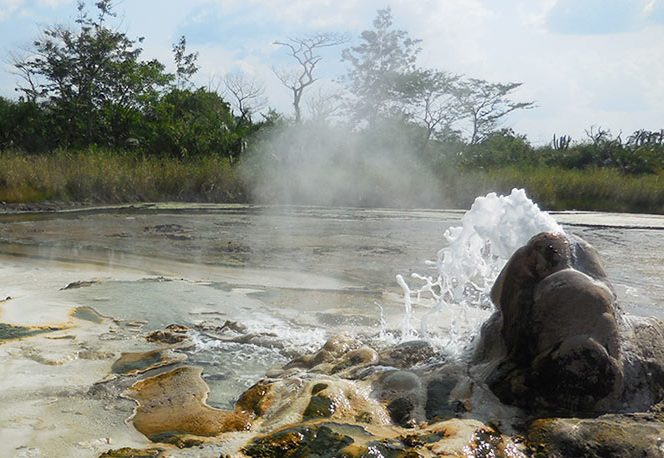
Semliki National Park – “half as many species of bird as the entire Congo”

Semliki (or Semuliki) is most popular for its Central African character, its outstanding birdlife and the famous Sempaya Hot Springs.
Semuliki National Park is arguably more Central African than East African, evidenced by the presence of palm trees, bird and animal species that are found nowhere else in Uganda, and Batwa ‘Pygmies’ who once originated from Ituri Forest, one of Africa’s most ancient forests.
The Semliki Valley lies in the Albertine Rift Valley, north-west of the Rwenzori Mountains. The Semliki River carries rainwater from the Rwenzoris to Lake Albert and the River Nile and forms a natural border with the Congo. This park is sometimes referred to as Bwamba Forest.



Sempaya Hot Springs is where local people used to cook their food. The ‘male’ spring measures 12 metres across. The ‘female’ spring boils at over 100°C and spurts bubbling water two metres into the air. It’s reported that the cloud of steam can be seen from as far as 2 km away! Read my steamy adventure at Sempaya Springs.
According to “Important Bird Areas in Africa and associated islands – Uganda” by Achilles Byaruhanga, Pantaleon Kasoma and Derek Pomeroy:
“Semuliki National Park is contiguous with the Democratic Republic of the Congo’s Virunga National Park. Much of the park is covered by forest. Although about 30% of the original forest cover was cleared during the 1970s and early 1980s, the encroachers were evicted and the forest is now slowly regenerating. Semliki’s conservation issues remain numerous: conflict over land-use, agricultural encroachment, poaching and illegal removal of forest products are compounded by high population density.”
The forest has “strong affinities with the Congo-Basin forests.” Semliki Forest contains half as many species of bird as the entire Congo. Seventy species are only known within Uganda from Semliki Forest, including 31 of “the Guinea–Congo Forests biome.” Semliki Forest is outstandingly rich in wildlife and includes 51 species of forest Swallowtail and Charaxes butterflies.
Birds that keen twitchers and ornithologists may see in Semliki and nowhere else in Uganda, include:
Bate’s Nightjar, Black Dwarf Hornbill, Black-casqued Hornbill, Black-collared Lovebird, Black-throated Coucal, Black-winged Oriole, Capuchin Babbler, Congo Serpent Eagle, Crested and Blue-billed Malimbes, Fiery-breasted Bush-shrike, Grey-throated Rail, Icterine Greenbul, Lemon-bellied Crombec, Long-tailed Hawk, Lyre-tailed Honeyguide, Nkulengu Rail, Northern Bearded Scrub Robin, Orange-tufted Sunbird, Pale-fronted Negrofinch, Piping Hornbill, Red-billed Helmet Shrike, Red-billed Hornbill, Red-chested Owlet, Red-rumped Tinkerbird, Rufous-sided Broadbill, Spot-breasted Ibis, Swamp Palm Bulbul, Wattled Hornbill, Western Bronze-naped Pigeon, White-bellied Kingfisher, White-crested Hornbill, White-thighed Hornbill, White-throated Blue Swallow, Yellow-throated Cuckoo, Yellow-throated Nicator, Zenker’s Honeyguide.
For safari game drives, venture to Toro Semliki Wildlife Reserve in search of buffalo, forest and savannah elephants, crocodile, warthog, waterbuck and Uganda kob. Pygmy hippo, elusive leopard and shy bushbabies can be seen occasionally.
Batwa dancers perform traditional cultural dance performances for visitors. Batwa cultural interactions can be arranged with the Uganda Wildlife Authority and are highly recommended.


























Excellent news for tourism in Semliki National Park – Uganda Wildlife Authority have reduced their fees. Once you pay park entry you can go on a guided nature walk to visit Sempaya Hot Springs (at no extra fee).
Letter from Uganda Wildlife Authority. Sempeya Hot Springs fee scrapped 2019
Semliki has been off the main tourism itinerary for most people but with the excellent tarmac road from Fort Portal and the substantially reduced fees, now’s the time to visit.